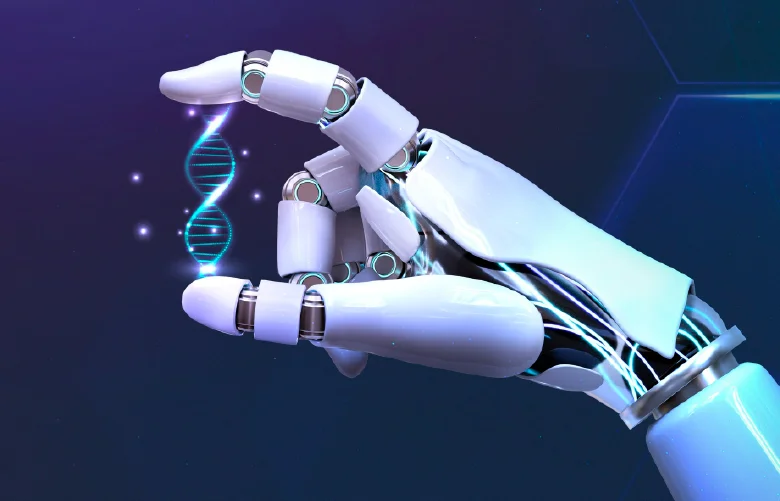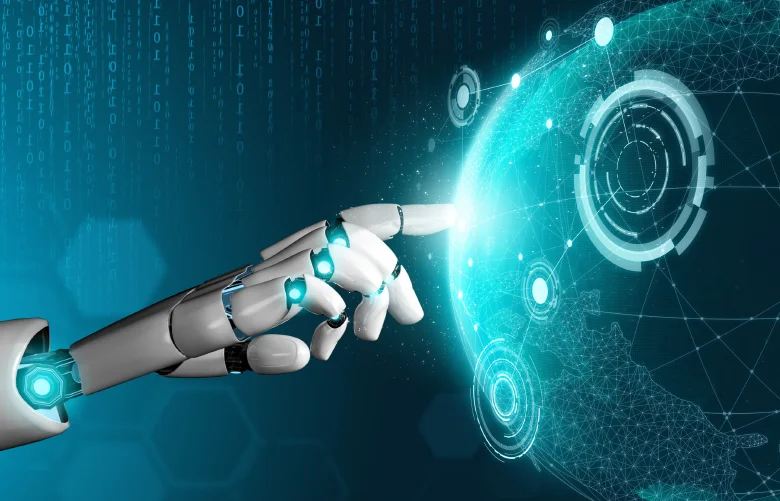Due to the pandemic, increased illnesses linked to contemporary lifestyles, and an expanding global population, our modern healthcare system is presently dealing with enormous problems. The good news is that healthcare might become more affordable, efficient, individualised, and equitable by leveraging AI to develop intelligent systems and workflows.
The healthcare organisations that are able to completely think and design their workflows, procedures etc., for applying AI and machine learning for healthcare to build a genuinely intelligent health system will be the most successful.
Table of contents
What is Machine Learning?
Using machine learning for healthcare, which is an essential part of artificial intelligence, the software programmes may expect outcomes accurately without having to be explicitly instructed to do so. In order to forecast new machine learning algorithms and output values, use past data as input.

POSTGRADUATE PROGRAM IN
Data Science & AIML
Learn Data Science, AI & ML to turn raw data into powerful, predictive insights.
How Is Machine Learning Used in Healthcare?
Applications of machine learning for healthcare are significantly changing this industry. ML is a kind of Artificial Intelligence (AI) technology that strives to increase the speed and accuracy of physicians’ work. AI offers great potential for countries struggling with overcrowded healthcare systems and physician shortages.

The best trial sample may be found using the healthcare data, which can also be used to increase the number of data points collected, evaluate trial participants’ continuing data, and correct data-based mistakes. Using machine learning for the health industry has the potential to revolutionise this industry. It gives healthcare professionals more time to devote to patient care rather than information entry or search. Check out the blog IoT project ideas to know more!
Benefits of Machine Learning in Healthcare
Machine learning has much to offer to the healthcare industry. Here are some examples of machine learning for health.
- Faster Data Collection
Healthcare practitioners are using wearable technology to gather real-time data that machine learning can analyse fast and learn from. This is highly important use of machine learning for healthcare - Improvement in Diagnosis
By analysing medical records and photos with ML-enabled technologies, better diagnoses may be made in the field of healthcare. It is one of the most beneficial use of machine learning for healthcare - Cost Reduction
By employing machine learning for healthcare instead of manual operations, machine learning can increase the overall cost-effectiveness of healthcare services. - Surgeries Performed by Robots
Modern technology, like machine learning, enables gadgets and machines to perform their functions. The most significant contribution of Machine Learning for the healthcare field would be robotic surgery. For many experts, the application has turned out to be promising. Want to learn Sorting in Data Structures? This blog might help!
Examples of Machine Learning in Health
Let us have a look at the 14 use cases associated with Machine Learning for Healthcare:
1.Hospitalisation Decision Support for Cancer Patients
Cancer patients often suffer from the treatment’s adverse effects or secondary disorders. It becomes challenging to decide the cause or symptoms of cancer in the body, making it difficult to choose the appropriate treatment or the right time to visit the hospital. But machine learning for healthcare or wearable data can simplify it by giving more details and indications, enabling proper acute disease management.
2.Personalised Health Treatments
ML in healthcare has paved the way for personalised treatment by changing therapy options. It helps doctors in effectively prescribing treatment.
3.Reduction of False Positives
ML in healthcare helps reduce false positives and negatives in medical reports and gives better results to improve accuracy.
4.Improvement of Medical Device Performance
Electronic medical devices are becoming sophisticated with technological advancements like machine learning for health to improve results accuracy.
5.Storage And Distribution Quality Control of Vaccine Cold Chains
Machine learning for healthcare helps predict the right freight temperature and optimise the logistics route.
6.Demand Forecast for Drugs
Early-stage drug development is one of the main clinical benefits of machine learning for healthcare. This involves identifying alternate treatment options for complex disorders.
7.Digital Health Coach for Physical Activities
Wearable devices track your activity and measure health-based factors to enable a proper data-driven health coach.
8.Quality Improvement in Paediatric Care
ML in healthcare has helped to develop an individualised and right paediatric treatment for children.
9.Early Prediction of Diabetes
Diabetes can’t be cured, but machine learning for healthcare can predict and take measures in advance to improve life quality.
10.Diagnosis and Disease Identification
Identifying and treating illnesses that are generally difficult to diagnose is one of the main uses of ML in healthcare. This can range from hereditary illnesses to tumours that are difficult to detect in their early stages.
11.Health Records Improvement
Maintaining accurate health records is a time-consuming task. The main purpose of machine learning for the healthcare industry is to simplify procedures to save time, money, and labour.
12.Predicting Liver Disease
ML in healthcare helps to predict liver diseases in advance, which helps the healthcare providers to decide on the right treatment for the patient.
13.Leveraging Crowdsourced Medical Data
Researchers and professionals may access huge amounts of data that individuals have voluntarily shared using crowdsourcing. The future perception of medicine is greatly affected by this real-time health data provided by ML in healthcare.
14.Epidemic Control
Today, researchers may access crucial information gathered via satellites, websites, real-time social media updates, etc., and compile this data to predict epidemics, particularly in third-world nations where vital medical facilities and educational systems are lacking.

82.9%
of professionals don't believe their degree can help them get ahead at work.
Challenges Faced in Machine Learning for Health Care

Despite the benefits of machine learning for healthcare, it still faces some challenges, such as:
- Lack of Quality Data to Build Precise Algorithms
- Building ML Tools Friendly to Medical Workflow
- Gather Big Teams with Broad Skill Sets in One Place
Conclusion
Machine learning for healthcare is significant because it aids in the creation of new products or services and provides businesses with a picture of trends in consumer behaviour and operational business patterns. So, join Hero Vired’s integrated programs based on AI and ML to acquire the right skills and experience a holistic learning path.
Author’s Note
Hero Vired is among the leading platforms offering learners the opportunity to equip themselves with the best data science, machine learning for health and artificial intelligence skills.
What role does data quality play in machine learning in healthcare?
How can healthcare professionals and organisations prepare for the future of machine learning in healthcare?
How can machine learning be used to improve patient engagement and satisfaction?
How can machine learning be used to improve hospital operations and resource management?
How can machine learning be used in drug discovery and development?
Updated on March 19, 2024
